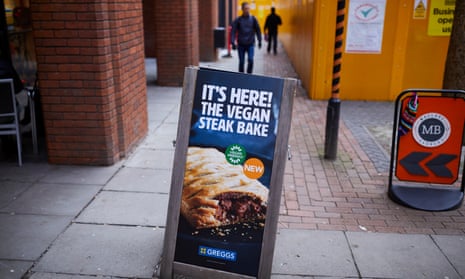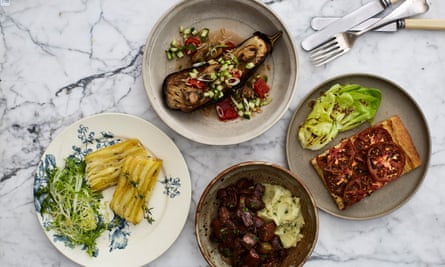From theguardian.com
Eight years after first asking people to go meat-free for a month, the couple behind the campaign say there is still work to do
When the first Veganuary began in 2014, the estimated 150,000 vegans in the UK were seen as eccentric ascetics.
Nearly a decade later, 9% of adults – about 6 million people – have tried going vegan for January, and adopting a plant-based diet and lifestyle is seen as entirely normal, according to new research.
Polling of 2,129 adults by YouGov for the Veganuary charity also found that 85% of meat-eaters who took part have either reduced or ended their meat consumption, while 71% had heard of the pledge.
Jane Land and her partner, Matthew Glover, came up with the idea while sitting at their kitchen table in York in 2013, after he had grown a moustache for Movember.
“The words vegan January just sort of merged together,” Glover said. “To begin with, we thought, we can’t possibly sell this word Veganuary to people. And in the early stages, people couldn’t pronounce it.”
They debated whether to aim for 100 or 1,000 sign-ups in the first year, and got 3,300.
By 2019, Greggs had launched a vegan sausage roll, Collins had added Veganuary to its dictionary, and the campaign was mentioned in the Gavin & Stacey Christmas special.
It became such a big deal that Boris Johnson was asked in January 2020, not long after becoming prime minister, if he was doing Veganuary (he wasn’t, he said, because it required too much concentration).
But the biggest change has been on supermarket shelves. Before 2018, between 4% and 7% of new food products launched each year were meat substitutes, according to Mintel figures, before jumping to 9%. Last year the figure was 12%.
 Greggs’ vegan steak bake, launched at the beginning of Veganuary in 2020. Photograph: Christopher Thomond/The Guardian
Greggs’ vegan steak bake, launched at the beginning of Veganuary in 2020. Photograph: Christopher Thomond/The GuardianKiti Soininen, Mintel’s category director for UK food and drink research, said manufacturers were now much more likely to boast about a product’s vegan credentials. Only 6% of new products in 2013 were badged as vegan or free of animal ingredients, but that jumped to 22% of launches in 2019 and 27% by 2022.
Much of the interest in Veganuary comes from flexitarians who are hoping to cut down on meat, Soininen said. Vegans still make up less than 2% of the population but 38% of adults now say they eat meat or fish less often, compared to 28% in 2017.
Food technology and the adoption of pea and soya protein have allowed the invention of no-beef wellingtons, chocolate no-cheesecake and the Beyond Burger. That makes things much easier, according to Jasmine Harman, the presenter of Channel 4’s A Place in the Sun, and one of the first celebrity supporters of Veganuary. Others include Deborah Meaden, Brian May and Chris Packham.
“Being vegan was seen as quite extreme,” Harman said. “Nothing was labelled at the time as being vegan or suitable for vegans so you had to check the labels on absolutely everything, which made shopping very time-consuming.”
There is also less resistance from friends or family. “A lady I’ve known for years told me ‘we don’t eat meat any more but I haven’t told my husband or my son yet’. They haven’t noticed.” Harman is also planning to put her new puppy on a vegan diet.
Vegan pet food sales are on the rise. A study published last year indicated that plant-based diets may be healthier for dogs, although the British Veterinary Association has warned that there is not enough evidence to say it is safe.
Going out to restaurants is now much easier, even outside the UK, Harman said, and veganism is becoming more accepted by the hospitality sector.
Alexis Gauthier, a Michelin-starred chef who became vegan in 2016, removed all animal products from his menus at Gauthier Soho in London in 2021. But convincing his partners, staff and customers was hard.
“Many of my old customers were really upset because it was the place where they had their wedding anniversary, where they celebrate their son’s graduation – it was very personal to them. I lost 5,000 of my regular customers, but I won 100,000 new customers.”
 Michelin-starred chef Alexis Gauthier’s vegan haute cuisine. Photograph: Lizzie Mayson/The Guardian. Food styling: Nena Foster. Prop styling: Anna Wilkins
Michelin-starred chef Alexis Gauthier’s vegan haute cuisine. Photograph: Lizzie Mayson/The Guardian. Food styling: Nena Foster. Prop styling: Anna WilkinsGauthier has developed a ‘faux gras’ which has all the texture of foie gras without harming any animals, and a bouillabaisse made with Swiss chard that he says is “like eating the sea”.
“The bitterness of turnips, pureed, with mustard and frozen, is the best ice-cream you’ve ever had. It sounds disgusting but I swear this is amazing.”
Although Veganuary has clearly changed the UK, the vegan aspiration to end animal exploitation is still a long way off. Researchers examining data from the ONS National Diet and Nutrition Survey found that Britons had cut meat consumption by 17% between 2009 and 2019, with a daily reduction of 13.7g of red meat and 7g of processed meat per person.
But there was also a 3.2g increase in white meat consumption, and the numbers of cattle, pigs and sheep slaughtered in the UK each year is broadly the same as it was in 2001, ranging from 26-29 million animals, according to Defra figures, while the UK population has also grown by about 3.7 million since 2011.
According to Glover and Land, there is still a lot left to do. “We’ve been asked a few times: are you happy with what Veganuary has achieved,” Glover said. “Well, no, not really, because animals are still getting eaten. When we launched the campaign, about 850 million chickens a year were slaughtered in the UK. Now it’s 1.1 billion.
“There’s a question of whether Veganuary has slowed the growth of what would have happened naturally. But we know that, as soon as someone takes part in Veganuary, that is causing a reduction.”
https://www.theguardian.com/lifeandstyle/2022/dec/31/veganuary-changed-uk-eating
No comments:
Post a Comment